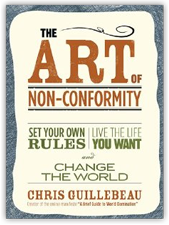
The art of non-conformity

Page 34: We tend to overestimate what we can complete in a single day, and underestimate what we can complete larger periods of time.
P. 40: Smart people are very good at making simple things complicated.
P. 40: When you do what you love, why would you burnout?
P. 40: If you are going to worry about something, worry about regretting a decision you really wanted to make but held back from because of fear.
P. 41: The people I talk with … tell me they „wish“ they could do something but fell unable have usually made a number of choices that prevent them from doing what they wish. They have chosen to prioritize other things above their stated desire.
P. 43: It is not the decision you make that is most important; it is the degree of commitment with which you make the decision. (Bo Bartlett)
P. 45: The absence of fear is not courage; it is mental illness. (Po Bronson)
P. 46: The greatest mistake in life is to be continually fearing you will make one. (Elbert Hubbard)
P. 49: To break the cycle, the fear of the unknown has to become less than the stale acceptance of the current situation. There are two ways to make this happen: 1) Increase the pain of the current situation. 2) Decrease the fear of the desired situation.
P. 58: When you want something, all the universe conspires in helping you to achieve it. (Paulo Coelho)
P. 59: Among other things, I worried a great deal about what other people thought of me, and I was so afraid of disappointing them that I would allow that fear to influence many of my decisions.
P. 60: Inaction breeds doubt and fear. Action breeds confidence and courage. If you want to conquer fear, do not sit home and think about it. Go out and get busy. (Dale Carnegie)
P. 61: „Will the world end if this does not go the way I expect?“
P. 63: Forcing the active decision is good for a couple of reasons. First, it often encourages us to step out in our fear, since we may realize that fear is the only thing holding us back. Second, even if we decide against the action we were considering, taking the active decision not to do it will at least get it off our mind. (Just note that when you let something go, you have to really let it go. Otherwise, you’re no better off than you were before you forced the decision.)
P. 64: „People don’t want you to be an actor. They want you to be yourself.“
P. 66: Fear is normal! The goal is to conquer the fear, not to avoid it or pretend it doesn’t exist.
P. 66: Asking yourself „What’s the worst thing that can happen?“ helps to put big decisions in perspective.
P. 68: The question is not who is going to let me, it’s who is going to stop me. (Ayn Rand)
P. 69: A critic is a man who knows the way but can’t drive a car. (Kenneth Tynan)
P. 70: People will always try to stop you from doing the right thing if it is unconventional. (Warren Buffett)
P. 85: It’s tempting to believe that the secret to happiness is less work. Here’s another idea: instead of giving up on the idea of work, why not find a way to make it better?
P. 87: Take your life in your own hands, and what happens? A terrible thing: you have no one to blame. (Erica Jong)
P. 126: If your actions inspire others to dream more, learn more, do more, and become more, you are a leader. (John Quincy Adams)
P. 154: If I can’t afford to pay for something in full, I don’t buy it.
P. 163: It is pretty hard to tell what does bring happiness; poverty and wealth have both failed. (Kin Hubbard)
P. 176: Radical exclusion is more a state of being than an activity, although it can be helpful to set aside a specific block of time for it.
P. 177: An important principle of life planning is that you can have anything you want, but you can’t have anything at the same time.
P. 185: Practicing the art of radical exclusion is good for two reasons: first, it eliminates the unnecessary from our lives. But just as important, when you say no to some things, it gives you the chance to say yes to many more. All things being equal, I’d rather regret something I did than wish I had done something (but sat it out due to fear or other commitments).
P. 192: One of the things that separates a goal from a dream is a deadline.
P. 194: „If you could do anything, what would it be?“
P. 209: Sometimes you need to reject a number of other, reasonably good choices to create a legacy project.
P. 215: I like to focus on deliverables (output) instead of hours.
P. 221: Be daring, be different, be impractical, be anything that will assert integrity of purpose and imaginative vision against the play-it-safers, the creatures of the commonplace, the slaves of ordinary. (Sir Cecil Beaton)
P. 226: We cannot be completely responsible for our past. What we are responsible for, however, is our future.
(Notes from: Chris Guillebeau: The Art of Non-Conformity)
